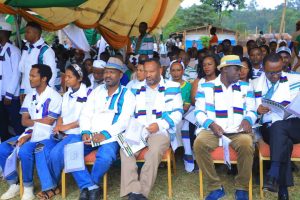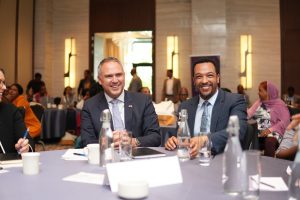
ADDIS ABABA- With the new administration announcing to streamline activities to the building of efficient institution in the second year of the reform, panelists and experts urge government to attach utmost forces to the cultivation of public servants ’mindset.
‘Addis Weg’ – a platform for dialogue on key public issues which the Office of the Prime Minister organizes – brought together yesterday experts from House of People’s Representatives, Addis Ababa University and private consultancy firms, among others.
The panelists and experts deliberated on challenges and opportunities to institution building in Ethiopia with the majority hammering the need for focusing on human capital to lay institutions on firm foundation.
As the task requires devising short and long-term mechanisms, participants indicated that the movement should start sooner than later, and, then, could mature gradually.
Civil Service Commission Commissioner BezabhGebreyes told participants that the government has prioritized mind cultivation citing the establishments of public institutions like Ministry of Science and Higher Education, Ministry of Innovation and Technology.
Speaking as current activities is meant to rectify past misdeeds in areas like the education sector, service delivery, political landscape and justice sector, he said the government has been drawing roadmap that could serve up to 15 years to put real successes in store.
He mentioned merit-based appointment of some officials could also be taken as a good leap forward.
To him, the merger of some public institutions and split of others based on the work process at each and every institutions is also an indication of a government committed to strong institution building.
Stressing that institutions could be modified and changed to suit current and emerging demands, Dr. RasworkAdmasse, who served at AAU for over three decades, noted it is unwise to blame culture for the problems the nation is facing. He said current generation should create a culture that aligns with the requirement of modern times. “Institutions could not take shape overnight.”
There is no easy short-cut that helps the building of a full-fledged institution, as the roads to efficient institutions could be diverse and yet rocky, indicated one of the panelists HiwotAlemayehu. An individual with a good mindset could be at the forefront of a change, but for the change to be sustainable, it should be inclusive.
Speaking in figures, she said the silent majority that could make up 50 percent needs to join the reformist 25 percent.
Nations could reap the blessings of transformation even devoid of natural resources, states Prof. Daniel Kitaw, who also served for over three decades at AAU.
The silver bullet to these countries achievements is their focus on human capital building. “Such countries championed in turning comparative advantages into competitive advantages.”
He also questioned: “Why do you think we, a big nation, receive aids from small countries [in size to us]?”
“We can talk about Lalibella, a precise architecture constructed from the rooftop to the base from a single rock, but current generation failed to even renovate the unique heritages with own expertise, why?”
To address such questions, he said, a great deal of works are ahead in terms of tackling attitudinal problems, communication gaps and cultural constraints.
Mindset cultivation needs to come top in the list of government agenda, while the work ought to participate households and schools as well.
Firmly built intercultural foundation makes disintegration impossible. The deep intercultural foundations built over centuries will not allow disintegration of Ethiopia, seasoned scholar of Addis Ababa University commented today.
At a dialogue organized by the Office of Prime Minister here, Prof. Daniel Kitaw said the strong cultural asset of communities in Ethiopia was not built overnight and cannot thaw easily. He said cultivating the mindset of the public, both in the short and long run, must get primacy to realize strong institutions and build prosperous Ethiopia.
He hints that the rhetoric of disintegration is only a daydream as the social and cultural forces that shaped the current Ethiopia have been so strong.
Dr. Fenta Mandefro who moderated the discussion also said everybody ought to detach from sense of ‘impossible’ to the horizon of ‘possible’.
BY WORKU BELACHEW





